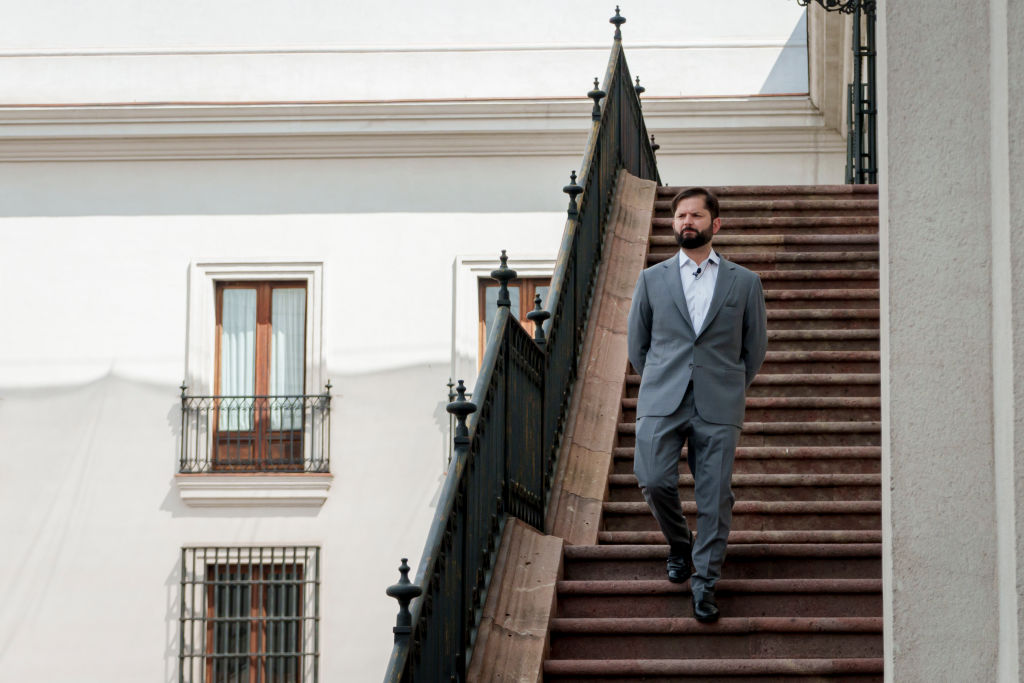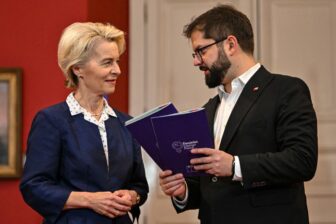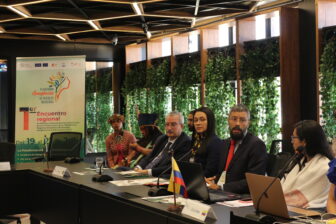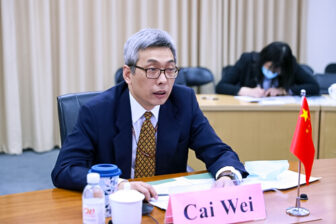SANTIAGO — Chile’s President Gabriel Boric is visiting China during a pivotal moment for both nations. The world has changed dramatically since the last official engagement by a Chilean head of state, Sebastián Piñera, whose 2019 visit was driven by technology and telecommunications. This time, even if trade is a prominent matter, politics will be in the air.
Boric’s first engagement with Xi Jinping occurs as Chile is increasingly confronted with foreign policy challenges, and the relationship between China and the United States has deteriorated. Since day one, Chile has condemned Russia’s aggression against Ukraine despite repeated calls for dialogue by the international community. At the same time, Boric has openly criticized human rights abuses by the governments of Venezuela and Nicaragua. Beijing still has in mind former Chilean President Michelle Bachelet’s 2022 report holding China accountable for “serious human rights violations” in her role as UN High Commissioner for Human Rights.
But on the line now are the sizable economic ties between the two nations. Chile boasts one of the world’s most substantial trade dependencies with the Asian powerhouse, as nearly 40% of its exports go to China. Boric’s arrival coincides with the third Belt and Road Forum in Beijing and “Chile Week China,” a trade promotion event in several Chinese cities.
The visit is significant for at least two reasons: It aims to deepen and reestablish connections with Chinese officials in the public and private sectors following the distance imposed by the pandemic. The President will count on the measured and mature leadership of Foreign Affairs Minister Alberto van Klaveren, and will be joined by two prominent figures from the Chilean Communist Party, Minister Secretary General Camila Vallejo and legislator Karol Cariola. This signals an approach that alleviates concerns about Boric potentially addressing human rights issues. While he voiced criticism of China when he was a member of Congress, now as head of state, he emphasizes the need for a pragmatic and economically focused relationship.
This journey also underscores that Chile’s relationship with China is strategic and vital for the Chilean state, transcending government changes. Chile Week China, an initiative created in 2015, represents a commendable effort for its continuity and long-term perspective. This exchange is crucial for maintaining a solid and exemplary relationship in the region, where political changes have affected the tone of relations with China.
The diversification strategy
Chile’s economic strategy towards China is to diversify its historically copper-reliant export portfolio and reduce dependence on significant exporters, focusing on strengthening small- and medium-sized enterprises, especially in regions outside of Santiago. The emphasis will be on the complementarity of both economies, particularly in the energy transition. Chilean lithium presents opportunities for Chinese companies seeking supply chain security for battery production, and Boric aims to convey that his national lithium policy is foreign capital-friendly. Boric also seeks to enhance cooperation with Chinese provincial governments and expand relations to second-tier cities such as Shenzhen, Chengdu, Guangzhou, or Chongqing.
Chile’s message emphasizes the current business environment that is conducive to continuous investment attraction, especially in the renewable energy and telecommunications sectors. Notable recent examples include announcements by BYD and the China-led Multilateral Cooperation Center for Development Financing (MCDF). Recently, it has been confirmed that the automaker BYD will construct a lithium processing plant, representing a significant investment of $290 million. As a sign of support, Boric met with the company’s CEO in Santiago just a few days ago. Furthermore, Boric has recently announced that the MCDF, a newly created Chinese multilateral financial mechanism, and the Development Bank of Latin America and the Caribbean (CAF) have agreed to implement the first submarine fiber-optic connection between Chile and Antarctica.
Chile’s deep economic and trade relationship with China and the Asian giant’s growing global political influence make it a central player in Chilean foreign policy. For Chile, it is essential to personally acquaint itself with its primary trading partner and present a strategic vision from the government.
The recent past
Chile diplomatically recognized the People’s Republic of China during Allende’s socialist government, and diplomatic relations remained intact even during Pinochet’s pro-market dictatorship. This bilateral relationship has demonstrated remarkable resilience to changes in government, a rarity in the region.
Each Chilean president who has visited China since Chile’s democratization has pursued a distinct agenda, focusing on various aspects of the bilateral relationship. President Ricardo Lagos, during his tenure, embarked on a visit in October 2001 with the primary aim of bolstering Chilean agri-food exports. Accompanied by a delegation that included ministers and entrepreneurs from various sectors, Lagos sought to boost trade in agriculture and viticulture.
In contrast, President Michelle Bachelet visited China during her presidencies in 2014 and 2017. Her second journey in 2017 revolved around Chile’s active participation in institutional frameworks promoted by China, such as the Asian Infrastructure Investment Bank (AIIB) and the Belt and Road Initiative. This agenda was oriented towards cooperation and engagement in China-led, globally significant economic initiatives. Despite deepening bilateral relations with China, as the United Nations High Commissioner for Human Rights from 2018 to 2022, Bachelet faced intense criticism from Beijing for a report in which she held China accountable for “serious human rights violations.”
President Sebastián Piñera addressed different topics during his two visits to China in 2010 and 2019. During his first trip, he focused on modernizing the free trade agreement between Chile and China, seeking to strengthen trade ties between the two nations. On his second visit, he was interested in technology and telecommunications, exploring advancements like 5G technology and business opportunities in Shenzhen. He visited the company BYD, which later contributed to Santiago’s public transportation system by supplying electric buses, and Huawei, evaluating 5G technology. The U.S. Department of State responded critically to Piñera’s engagement with Huawei and the possibility of a transoceanic cable between Chile and China.
These journeys indicate that Chilean presidents’ agendas have adapted to the evolving needs of the bilateral relationship while demonstrating how the engagement has deepened and become more complex. After nearly a year and a half of a government marked by domestic challenges, including economic contraction, the drafting of a new constitution, and ministerial changes, Boric is aiming to, at the very least, reinforce that the relationship between China and Chile remains solid and pragmatic.
__
Urdinez is an associate professor of political science at the Pontificia Universidad Católica de Chile and the director of the Millennium Nucleus on the Impacts of China in Latin America
Montt is an associate professor of history at the Pontificia Universidad Católica de Chile and the deputy director of the Millennium Nucleus on the Impacts of China in Latin America








